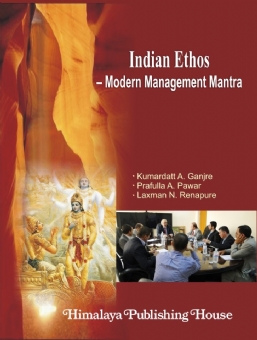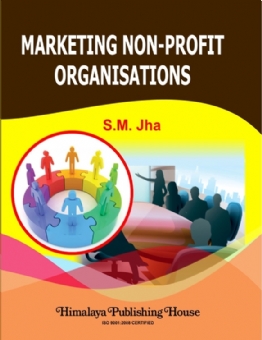This book covers all the aspects of human intelligence in terms of values and ethics. This is a modest attempt to cover all the aspects of Indian Ethos which can be easily understood, which are categorized in fifteen chapters with individual contents.
The very first chapter − Bases of Indian Ethos − covers each soul is a potential God, a holistic Approach towards humanity, Importance to Subjectivity / Objectivity, Karma Yoga, Yogah Karmasu Kaushalam, Human Co-operation, Summary and exercise.
Chapter 2 includes Modern Approach towards Indian Ethos that will be detailed as Introduction, Indian Management Thoughts, Holistic Approach to Management, Indian Ethos − Defining the concept, Sadhana −In Management context, Indian Ethos − Modern Management Concept, The Tatwas in Indian Ethos and the exercise.
Indian Ethos Management Thoughts and Practice is covered in Chapter 3 that incorporates Harmony with Environment, Dharma, Swadharma and Detachment, Holistic approach to Personality, Dharmic Leadership, Personality, heredity and Environment.
The discussion about Ethos in Indian context is continued in Chapter 4 that includes Introduction as a social Audit of Indian cultural environment, Eco-friendly Technology and Ecological Responsibility of Business, Understanding Work Ethics and Ethics in Work, Business ethics, values and human rights, Common ethical and Unethical Business practices, Holistic approach to management and Exercise.
The new concept of Management Performance − Indian Context can be well understood in Chapter 5 as a Managerial functions and organizational functions, Flow of managerial process, Indian management thoughts and practices, Management Cycle.
The current trends and Era in Knowledge Economy is discussed in Chapter 6 with details in terms of Introduction −− Knowledge workers (People), The age of the knowledge capital, Building blocks of a learning organization, Structure of the new people management, Business strategy, and summary and exercise is given at the end.
Chapter 7 includes Learning and Education System in India covering Defining Learning, types of learning, Selective theories of learning, Importance of Learning, Gurukul System of Learning, The beginning of modern education system, Distinguish the traditional Indian Nature of Learning with the Modern Method of Learning, Achievements of the Indian education system and brief summary and exercise.
Human Values and Its Implications is taught in Chapter 8 that includes importance of Human Values, Objectives of value-based system, Interrelation of Values and Skills, Learning through Traditional methods of mind purification, Modern methods of mind purification, Implications in practice, Learning values through cases with summary and exercise.
The importance of Work Ethics and Motivation is covered in Chapter 9 with details of Value concept, Human and ethical values are the wealth of character, Need for human values and ethics, Work motivation, Indian approach to motivation, Western approach to motivation, Indian ethos and motivation, American style of motivation and Japanese style of motivation
The new and fresh Chapter 10 will put a focus on Value-oriented Holistic Management with definition about, Values, Dharma, Moral and ethical values, The brief discussion about Significance of values, Golden rule of ethics, Values and skills, Values and the workplace, Value-based Human response management, Need of value-based holistic management, Value-driven management, Indian culture and wisdom, The ethical and spiritual values and Methods of heart and mind purification.
Indian Styles of Leadership is well discussed in Chapter 11 covers Indian styles of leadership, `Born` leaders and `Made` leaders, Styles of management, Karta in Hindu undivided family, characteristics of leading business industrialists in India, Leadership Matrix analysis, Entrepreneurial leadership style, Role of Transformational leadership, Role of leadership character in management, Leadership style change according to the situation, with summary and exercise.
The best examples about Top Leaders as Role Models is seen in Chapter 12 includes Characteristics of the Indian leading industrialists, Family-managed Indian business organizations and MNCs in India, The structure of task-high leadership, The importance of values in leadership and Changing leadership style.
Value-based Leadership − In Consciousness is covered in Chapter 13 with details about Aspects of science and consciousness, Consciousness in organizational theory, Management − The Lord Shiva of management, The deepest of your values at work, Spirituality in management.
Chapter 14 gives in-depth information about Social Harmony and Social Morality that includes Mental Health, Ethics and morality, Corporate entity in ethics and morality, Holistic approach towards etho-morality, Salient Aspects of Social-cultural Change in India with Summary and exercise.
Really, it is a modern approach that can be visualized from all the angles of Indian ethos.
Contents :
1. Bases of Indian Ethos
2. Modern Approach towards Indian Ethos
3. Indian Ethos managements − Thoughts and Practices
4. Ethos in Indian Context
5. Managerial Performance − Indian Context
6. Era in Knowledge Economy
7. Learning and Education System in India
8. Human Values and Its Implications
9. Work Ethics and Motivation
10. Value-oriented Holistic Management
11. Indian Styles of Leadership
12. Top Leaders as Role Models
13. Value-based Leadership − In Consciousness
14. Social Harmony and Social Morality
15. Case Studies
Selective Readings
Websites







